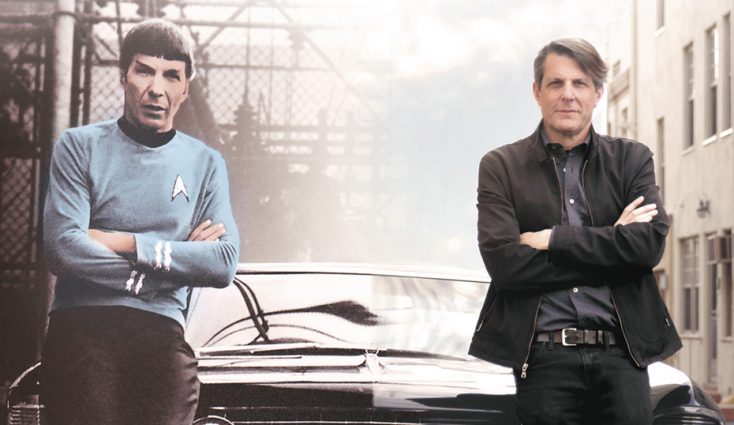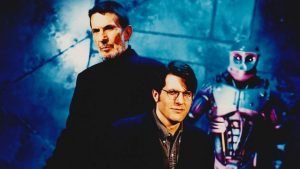By LYNN BARKER
Front Row Features
HOLLYWOOD—When Spock actor Leonard Nimoy died in February, 2015 at age 83, he and then 59-year-old son Adam were working on a documentary to be centered on the famous, pointy-eared Vulcan character in celebration of the 50th anniversary of the popular, original “Star Trek” TV series. After his dad’s death, Adam decided to steer the doc in a more personal and wider direction. The Kickstarter-funded “For the Love of Spock,” which details the senior Nimoy’s entire career and family life, is the heartfelt result.
Adam Nimoy describes the doc this way: “It’s Spock. It’s the career of Leonard Nimoy. And it’s my life with the two of them.”
The filmmaker reveals that he and his dad were estranged on and off through his teen years and well into adulthood. During Adam’s youth, Leonard’s sudden fame not only affected him but his entire family in positive and negative ways. Dad wasn’t available much. Adam rebelled in several ways, becoming a self-professed druggie “Dead Head” while in college at U.C. Berkeley and, in lean years, dad Leonard turned to alcohol.
Nimoy credits 12-Step Recovery programs, which he admits “aren’t for everybody,” with aiding the later-in-life reconciliation that he and his famous dad achieved. It was Leonard that Adam phoned for help when, after a short marriage, his wife died and it was the elder Nimoy who supported his son in a career change from entertainment lawyer to TV director. In 1995, the younger Nimoy directed his father in a remake of his famous “Outer Limits” episode “I, Robot.”
I spoke briefly with Leonard Nimoy on several occasions about his personal and professional life between 1975 and his last press conference for “Star Trek Into Darkness.” I found him to be attentive, kind and, yes, funny. Since Mr. Spock attempts to not express emotion, I asked his son if he remembered the lighter, “fun” side of his dad.
Nimoy: My dad and I were in Boston in 2013. He was born and raised in Boston. We got on a Duck Tour. It’s a tram or van that rides around Boston to all the sites then it turns into an amphibious vehicle and gets in the water on the Charles River. Dad always walked around in a baseball cap and sunglasses and was not generally recognizable.
The tour guide is up front on the speaker talking about Paul Revere, John Adams, John Hancock and John Kennedy and we drove to the West End and he said, “Of course the West End’s most famous resident is Mr. Spock of ‘Star Trek.’ Are there any Leonard Nimoy fans on the bus?” There was cheering and dad is just nodding. He was very cool. At the end, everybody piled off the bus and dad got off and took off his hat and glasses and introduced himself, and the tour guide went white. I loved experiences like that with dad.
Q: Why do you think fans were and are so taken with the Spock character?
Nimoy: The most dominant reason is the fact that Spock is this essential outsider, separate and apart from the rest of the crew. Dad reminded me not long before he passed away that Spock is unique in that he’s the only alien on the core crew on the bridge of the Enterprise. There are other people who come from minorities or different nationalities but we’d never seen this where an alien is involved with a human crew and trying to integrate, give the best of himself, trying to work towards the good of the many on the crew.
A lot of us feel like we’re outsiders. We feel alone, marginalized. (But Spock) has special skills. He is unique. He is revered and respected by his peers and vital to the functioning of that crew. That also resonates with people—that they are worthy and still have something they can offer to society as a whole.
Q: Didn’t your dad feel like an outsider in his early life?
Nimoy: That is what he felt as an immigrant being raised in the West End of Boston. He was an outsider, the son of Russian immigrant parents in a very defined neighborhood of immigrants. His whole objective was to find a way to integrate himself with the whole of society, to give the best that he had to give, which is exactly why he left when he was 18 years old and got on a train for three days to come to Hollywood, because he wanted to be a part of American culture. I think that is the reason that he and Spock are relevant today, 50 years later.
Q: When you were a kid, what was the breaking point with “Star Trek” fans? Was there an incident when all the fan attention went from cool to just inconvenient and kind of upsetting?
Nimoy: Yeah, there were a couple of key turning points for me. Very early on when the series first started, my dad and I had very little time together and he took me on the weekend to a carnival in West L.A. When we got there a few kids recognized him and came up and he signed autographs and they went away and I thought we were in the clear but, within minutes, he was mobbed in the parking lot. Everybody at that carnival wanted to get to him to have their picture taken or get an autograph. It was over. My dad turned to me and said “We have to go.” We had to push through the crowd and leave.
Q: That must have been upsetting and kind of frightening to a young boy.
Nimoy: Well, it was very uncomfortable and difficult for me, very challenging. Our lives had changed and that was a turning point. It was like that all the time. We had to be more cognizant of where we were and how we were going to spend father/son time together. There is no rulebook, lesson or school about becoming a celebrity and what it’s gonna be like. Spock was popular right away. It was out September 8th (1966) and by the 4th episode, the fan mail was everywhere (at home). It came very fast and was a big adjustment for all of us.
Q: As you became a teen and into college, the lack of father/son time took its toll. What would you say to kids and teens who feel estranged from their parent as you did?
Nimoy: Just hold on. You’ve got to hold on. It will pass. It’s a very difficult time. Just universally, it’s a very common experience to want to separate yourself, create your own identity, rebel against your parents and try to be detached but you can’t a lot of times because of economic situations, or you’re in school and are simply not old enough to leave home. But when I was 18, I was gone.
My dad and I had a lot of conflict when I was a teenager, and then I wanted to go away to school at the University of California (Berkeley). We lived right next door to UCLA and my dad was like, “Do you know how many kids would kill to live in this house and be able to walk to school? That’s the craziest thing I ever heard.” I was saying, “We have so much conflict. I want to get out of here.” So, it’s a matter of holding on and getting through these periods. In our case, we needed 12 Step Recovery to help us through. It’s not for everybody but it worked for us.
Q: What did you discover about yourself through making this film?
Nimoy: Just the incredible amount of gratitude I have. I was a big fan of my dad during a lot of his professional career and I was very supportive and very proud of him but we had a lot of conflict, as I said. I was so grateful that we were able to reconnect the last four or five years of his life to the point where he was my go to guy when I was suffering through a personal tragedy (the death of his wife). It was a very happy ending with him. It’s inspirational to me and gives hope to a lot of other people who have dysfunction in their families and are trying to turn it around.
Q: What TV shows were you watching and liking when you were a kid in 1966 when “Star Trek” came on? If your dad weren’t in it, would it be your kind of show back then?
Nimoy: I was watching “Lost in Space” and “The Outer Limits.” Dad appeared in that a couple of times and “The Twilight Zone.” (“Star Trek” co-star) Bill Shatner appeared in that. I loved those shows. So much stuff was going on in the 1960’s. I was a TV kid (who watched) “The Man From U.N.C.L.E.”, “I Spy,” and I loved the westerns (including) “Broken Arrow” and “Gunsmoke.” Dad played an Indian or he played a gambler. He was on “Wagon Train” and “Rawhide” and “The Big Valley.” I watched “The Wild Wild West.” He brought home a Polaroid picture of himself in costume that some wardrobe person took. I loved it. I was a fan of “Zombies of the Stratosphere.” I would have been watching “Star Trek,” if dad wasn’t on it.
Q: How did you find out about the Burning Man tribute to Leonard depicted in the documentary? That was so beautifully shot as well.
Nimoy: Thanks but I wasn’t there. My daughter Maddie was there with her boyfriend. At the end of the week they always burn the temple and the stick figure man. When she there, she saw the temple with this picture collage of dad’s whole career. It was a very emotional, overwhelming experience for her. She called me and we started looking for footage of it. We found it and also film at night when they burned it so we put it all together with an incredible score.
Q: What do you most hope both fans and those who didn’t know much about Leonard take away from seeing this film?
Nimoy: First and foremost, that they get an understanding of Spock. They know who he is and what he looks like but they don’t know what he stands for and why fans connect and relate to him. And, even the fans, I wanted to give them a good dose of Spock in terms of his history—how he was created, how he evolved and the best of Spock in the (film) clips.
Also, I wanted fans to get a sense of who Leonard Nimoy was as the artist, the Renaissance man. And, finally, I want people to come away with some sense of my dad and as a family man and what we had to deal with as a celebrity family and what I went through personally with my dad—the ups and downs and that we were finally reconciled. I hope it is an inspiration for people who have these issues with their own families.
Q: You asked everyone you interviewed in the film to describe Leonard Nimoy in one word. So what word, for you, sums up your dad?
Nimoy: Passion. That was what my dad was all about. He was passionate about his work. It’s what inspired him to leave the West End of Boston on his own and come to Hollywood where he had no connections, no safety net, nothing. This was also in his 2012 commencement speech at Boston University to the College of Fine Arts: You’ve got to be passionate about what you do. You’ve got to find out what your calling is and give it your best. That’s what he was all about and that’s how I’m trying to live my life, and that’s a big part of his legacy.





